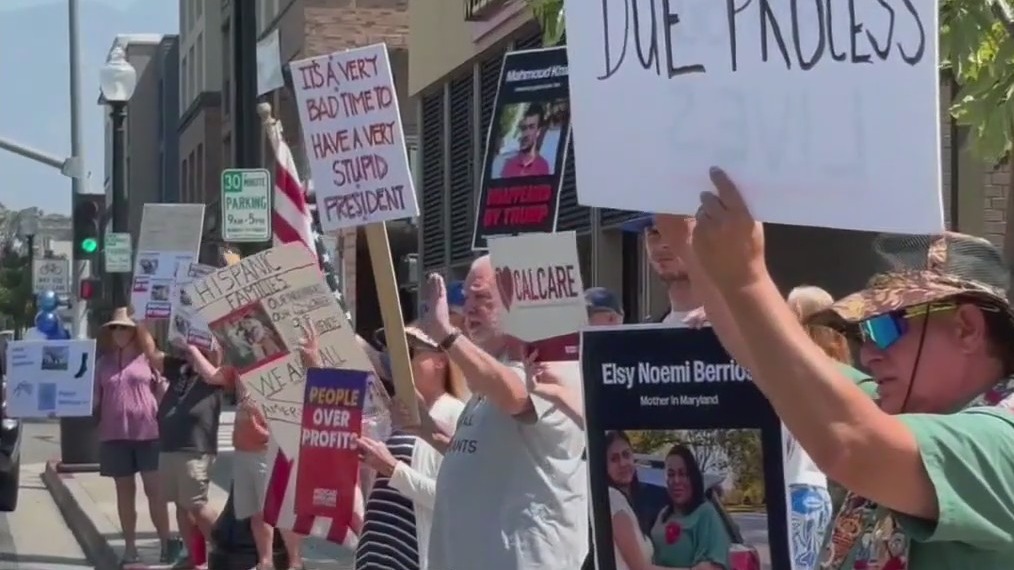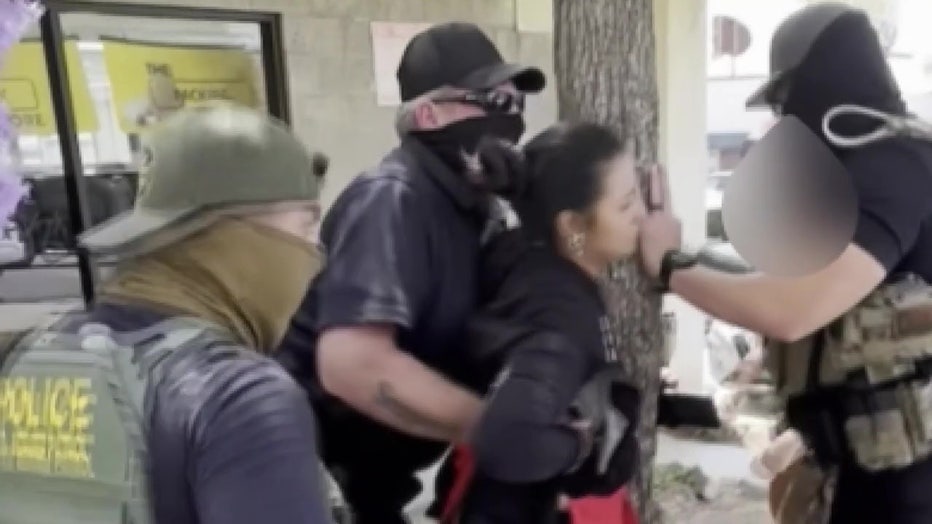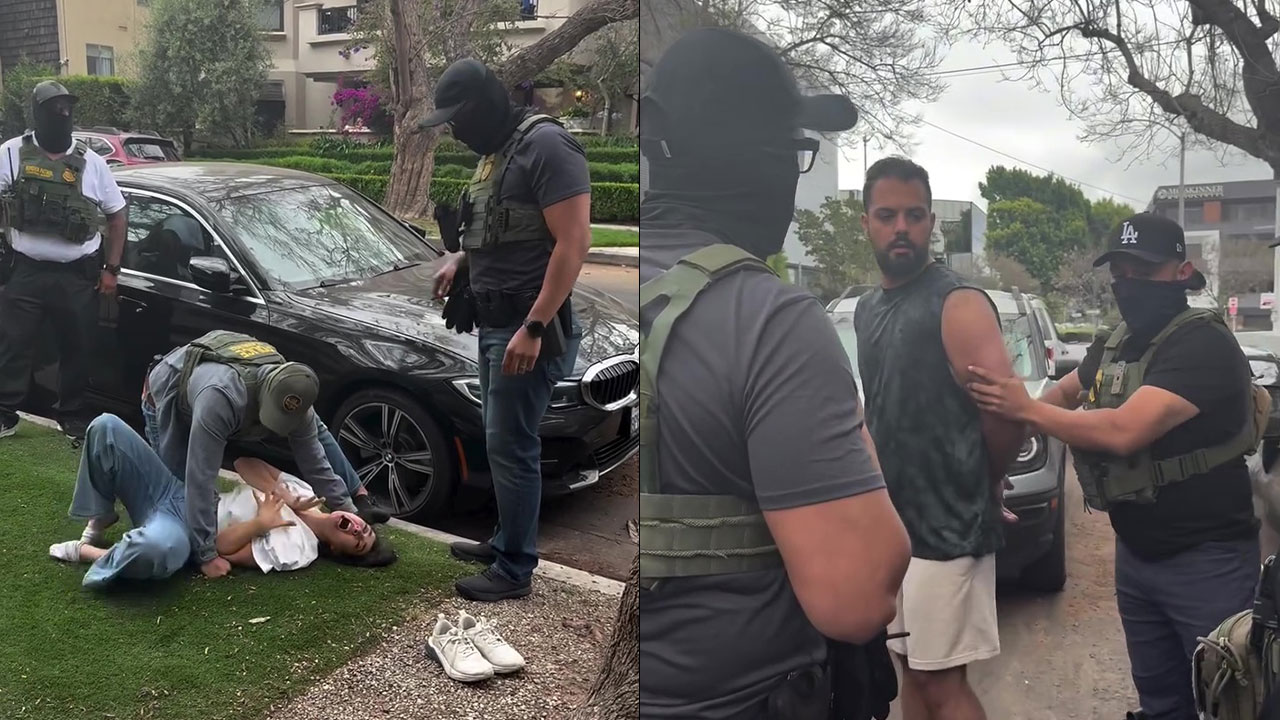Days after vendor arrested in Ladera Heights, family says they can't locate her

Seeking transparency in SoCal ICE detainments
Federal agents detained a street vendor outside a Ladera Heights Home Depot nearly four days ago. Family said they can't find her and haven't heard from her. Activists say they want more transparency from immigration officials.
LOS ANGELES - New video shows what appears to be federal immigration officials prying a street vendor clinging to a tree at the Ladera Heights Home Depot, ignoring onlookers' demands for ID or an arrest warrant. The woman is just the latest who activists say has been "disappeared."
What we know:
The arrest happened on Monday, June 23, just before 11 a.m. Two masked men chased a street vendor down the road before she grabbed on to a tree. Onlookers took video of the interaction, demanding the men identify themselves. More eventually showed up, ripped the her off the tree and shoved her into a car before taking off.

What they're saying:
Now, people like Aleca Le Blanc are working to help her family find out where she's being detained, and they're having trouble. Her family has not heard from her.
"It took more than two days for her name to show up in the locator," said Le Blanc. "I checked again this morning. There's still no location for her, and it's been four days. As far as I am concerned, she was disappeared."

Pastor records detainment of Iranian asylum seekers in LA
A scene of distress unfolded outside a home in Los Angeles earlier this week as Iranian refugees, who reportedly had sought asylum in the United States after fleeing persecution in Iran, were arrested by immigration officials. The arrests have drawn sharp criticism from a pastor at Cornerstone Church West LA, who witnessed the events unfold.
"The Disappeared" is what a group in Ontario is calling detainees whose families, and sometimes even attorneys, are having a hard time finding after they're swept up by federal agents.
Officials at the Los Angeles Consular offices for countries like Guatemala tell FOX 11 that they can't find detainees to check on them, saying detainees are not being allowed to use phones to call family.
"Where is due process" ask activists behind the #DissapearedinAmerica movement.
Adrian Martinez, a US citizen who was recently released from federal custody after Border Patrol agents arrested him in Pico Rivera last week, told FOX 11 that he was ignored when he asked for a phone call.
Featured
US citizen arrested by Border Patrol in Pico Rivera speaks out after violent arrest
Border Patrol said they arrested Adrian Martinez, a U.S. citizen, for punching two officers during an immigration operation at a Pico Rivera Walmart. After watching the video, a federal judge said he threw no punches.
Dig deeper:
Federal officials have said agents fear not only for their safety, but also their families', when videotaped by activists who might publish their names on websites, exposing them to danger. Homeland Security guidelines indicate agents should identify themselves, but don't have to until "it's safe and practical to do so," which they don't believe to be while surrounded by angry, cell phone-holding, onlookers.
If they are showing up at a home, or business, you have the right to ask for a judge-signed affidavit or warrant, which you can ask to be slipped under the door.
What you can do:
If you think federal agents seem to be acting under a different set of rules than local police would be, you are right. In California, for example, arrestees have the right to make at least three local phone calls, free of charge, within a reasonable time of being booked (usually three hours, if the investigation permits).
With federal authorities, especially ICE detentions, phone call rights are not as clear, especially when a person is first detained, but not yet processed. Officers do not have to let you use your cell phone to call your family, for example. A phone will be made available if you demand to speak to a lawyer, but there isn't a time restriction. In other words, you may not get that phone call until after you are processed. And keep in mind that once transferred to a detention center, the phone calls are not free. Each facility can set its own parameters.
Be prepared, say attorneys, suggesting immigrants memorize an attorney's hot line phone number, before they run into a problem.
The National Immigration Law Center has an exhaustive list of instructions about what to do if you're stopped by immigration. That information can be found by tapping or clicking here.
The National Immigrant Justice Center has info on your rights if you encounter ICE here.
The other side:
FOX 11 has reached out to the Department of Homeland Security and U.S. Customs and Border Protection for comment on
The Source: Information in this story is from Aleca Le Blanc, Jose Arturo Rodriguez-Diaz, Consulate General of Guatemala in Los Angeles, Adrian Martinez, the Department of Homeland Security, U.S. Customs and Border Protection, and previous FOX 11 reports.


